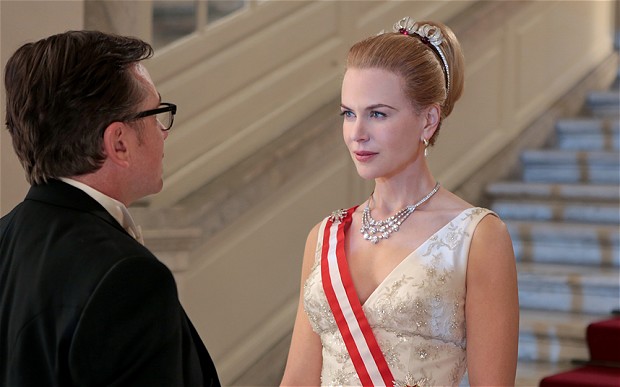Grace of Monaco, the Grace Kelly biopic starring Nicole Kidman, is an absolute joy, and I highly recommend it. Unless you live under a rock, which I think I might envy (dark, quiet, peaceful, but maybe dank?), you’ll know it was savaged at Cannes, but don’t let that put you off, as this isn’t just some middling turkey; this is a big, glistening, strutting turkey. This is one of those turkeys so jaw-dropping it achieves grandeur of the kind I find quite irresistible. Also, as a reviewer, sensationally bad films are always a pleasure because they are easy to write about — I plan to knock this off in under ten minutes — and you can take any number of cheap shots. Sometimes, there is quite a wait between jaw-dropping turkeys, and your cheap shots build up, which is bad for the heart. (Cheap shots are quite like cholesterol in this way.)
The film was, happily (if you like a strutting turkey), much troubled before it even opened, with Monaco’s royal family condemning it as a ‘farce’, while, at one point, it looked as if it might not get an American release, due to a very public spat between the director Olivier Dahan (La Vie en Rose) and the distributor Harvey Weinstein over the final cut. Weinstein did not like Dahan’s version, then Dahan did not like Weinstein’s version, denouncing it as ‘catastrophic’ and ‘a pile of shit’. I think I saw Dahan’s version, as it’s the one being shown in Europe, and if Weinstein’s is even worse, I sincerely hope and pray to see that some time.
It all takes place in the early 1960s, five years into Grace’s (Kidman) marriage to the emotionally distant Rainier III, as played by Tim Roth, who smokes and has a moustache and looks as if he doesn’t know quite what else to do, so he’ll just settle for smoking and having a moustache, at an emotional distance. Grace, who, at this time in her life, is torn between her stifling role as a royal and returning to Hollywood as an actress, is visited by Alfred Hitchcock, who wishes to offer her the lead role in Marnie. Hitchcock is played by Roger Ashton-Griffiths, although we have recently seen him impersonated by Toby Jones and Anthony Hopkins. Isn’t that typical? You wait ages for one screen Hitchcock then three come along in a row. We know Grace takes the prospect of Marnie seriously because we see her reading the script in bed, with glasses on. (Cheap shot, but I need to offload quite a few, or I may keel over one day.)
The film is glamorous and well styled, offering decent period-frock porn (Dior, Chanel, etc.) and diamonds and up-dos and those nice baby-blue, open-topped cars with rounded proportions that I like so much. But the direction is bizarre. No. The direction is jaw-droppingly bizarre. Everything is bathed in a sickly, Disney-style, soft-focus golden light while the camera constantly opts for the back of Grace’s hair, or sudden close-ups that are frighteningly sudden and frighteningly close. These are so distracting that Ms Kidman, particularly, doesn’t stand a chance on the acting front. You are solely thinking: ‘Gosh, she has pores. And nasal hair. Are pores and nasal hair even allowed, in Hollywood?’ Plus, her forehead is so…ahem…tight that as she struggles for expression you genuinely fear one of her eyebrows might ping off, possibly into your lap, and then what are you going to do? Take it home and keep it as a pet? Will it need walking? (Cheap shot, etc.)
The script, which, throughout, drops exposition like hefty concrete bricks — there are moments when you feel as if you are actually being rained on by hefty concrete bricks — tries to link Grace’s fate to that of Monaco via a ‘political crisis’, which sees Charles de Gaulle demanding Monaco relinquish its sovereignty to become part of France. This involves lots of men sitting around, speaking in random accents. (Robert Lindsay’s accent as Aristotle Onassis is the most delicious, as it seems especially random.) But this forces Grace to stop dithering — even though she was serious about Marnie; she read the script with glasses on — and step up to the plate, at which point the film becomes a sort of My Fair Lady, as she takes lessons in how to be a proper royal from Derek Jacobi (playing Count someone-or-other, an etiquette expert in a cravat). She then saves the day, winning over de Gaulle by throwing a simply lovely ball and being simply lovely at it. The film had opened with a quote by Kelly saying: ‘The idea of my life as a fairy tale is itself a fairy tale’ — and then it goes on to become that fairy tale itself. Quite brilliantly wrong.
It’s all superficial. We learn nothing about Grace as a wife, mother, princess or person, except that she is always on the brink of tears, the big ninny. And it has all the emotional heft of one of those American daytime TV biopics that used to star Cheryl Ladd, or one of those actresses from Cagney & Lacey. It really is a particularly fine turkey, and I highly recommend it, although, obviously, there’s no way I’m ever going to be sitting through it again. Is that a cheap shot? Hoping so.






Comments